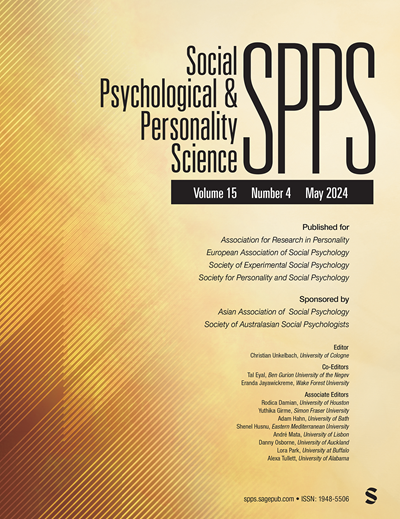The Social Cure Properties of Groups Across Cultures: Groups Provide More Support but Have Stronger Norms and Are Less Curative in Relationally Immobile Societies
IF 3.3
2区 心理学
Q1 PSYCHOLOGY, SOCIAL
引用次数: 0
Abstract
We investigate whether the social cure properties of groups vary across cultures, testing hypotheses that the associations between multiple group memberships (MGM) and depressive symptoms will (a) be mediated by social support and uncomfortable normative pressures, and (b) vary systematically with sample-level relational mobility. Analyses of data from a survey ( N = 5,174) conducted within k = 29 samples show that MGM is negatively associated with depressive symptoms, an association fully mediated by social support and uncomfortable normative pressures. In line with our theorizing, in samples with higher levels of relational mobility constraints, the association between MGM and depressive symptoms is weaker, the associations between MGM and social support and between MGM and normative pressures are stronger, and the association between social support and depressive symptoms weaker. The indirect link between MGM and depressive symptoms via social support is significant at both low and high levels of relational mobility constraints.不同文化中群体的社会治愈特性:在相对不流动的社会中,群体提供的支持更多,但规范更强,治疗效果较差
我们研究了不同文化背景下群体的社会治愈特性是否存在差异,并检验了以下假设:多重群体成员身份(MGM)与抑郁症状之间的关联将(a)由社会支持和不舒适的规范压力所中介,以及(b)随样本水平的关系流动性而系统性变化。在 k = 29 个样本中进行的一项调查(N = 5,174 个样本)的数据分析显示,多重群体关系与抑郁症状呈负相关,这种关系完全由社会支持和不舒适的规范压力所中介。与我们的理论相一致的是,在关系流动性限制水平较高的样本中,多重婚姻关系与抑郁症状之间的关联较弱,多重婚姻关系与社会支持和多重婚姻关系与规范压力之间的关联较强,而社会支持与抑郁症状之间的关联较弱。在关系流动限制水平较低和较高的情况下,通过社会支持实现的最低指导标准与抑郁症状之间的间接联系都是显著的。
本文章由计算机程序翻译,如有差异,请以英文原文为准。
求助全文
约1分钟内获得全文
求助全文
来源期刊

Social Psychological and Personality Science
PSYCHOLOGY, SOCIAL-
CiteScore
12.50
自引率
1.80%
发文量
77
期刊介绍:
Social Psychological and Personality Science (SPPS) is a distinctive journal in the fields of social and personality psychology that focuses on publishing brief empirical study reports, typically limited to 5000 words. The journal's mission is to disseminate research that significantly contributes to the advancement of social psychological and personality science. It welcomes submissions that introduce new theories, present empirical data, propose innovative methods, or offer a combination of these elements. SPPS also places a high value on replication studies, giving them serious consideration regardless of whether they confirm or challenge the original findings, with a particular emphasis on replications of studies initially published in SPPS. The journal is committed to a rapid review and publication process, ensuring that research can swiftly enter the scientific discourse and become an integral part of ongoing academic conversations.
 求助内容:
求助内容: 应助结果提醒方式:
应助结果提醒方式:


